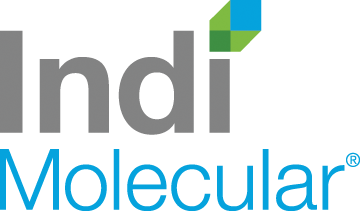Indi Molecular Publishes Data on KRas in Analytical Chemistry Demonstrating Allosteric Inhibition and Accelerated Discovery Time of Indi Molecular’s Proprietary PCC Technology
CULVER CITY, CA, August 3, 2018 - Indi Molecular, an emerging biotechnology company, today announced it has published preclinical data in Analytical Chemistry demonstrating the development of a barcoded rapid assay platform for the analysis of hits from PCC macrocyclic peptide library screens. This platform was employed to evaluate candidate PCC ligands identified from screens against two conserved allosteric switch epitopes of the Kirsten rat sarcoma (KRas) protein. Indi Molecular is developing therapeutics and PET imaging agents to treat and diagnose a variety of oncology, autoimmune, and infectious diseases.
“KRas is a major oncology target that has proven extremely challenging to drug,” said Jim Heath, Ph.D., co-founder, Indi Molecular and President of the Institute for Systems Biology. “Using Indi Molecular’s proprietary PCC platform, we are now able to create a large range of highly specific binding molecules that can be tuned to allosterically modulate KRas function and do this with unprecedented speed of discovery.”
The peer-reviewed article entitled “An Allosteric Inhibitor of KRas Identified Using a Barcoded Rapid Assay Microchip Platform” by McCarthy, et al, includes data on the barcoded rapid assay platform (B-RAP), which is a microchip platform designed so that an entire set of candidate PCC ligands may be rapidly evaluated in parallel, using minimal quantities of reagents. The B-RAP technology was used to analyze the hits resulting from an epitope targeted in situ click screen against the KRas protein. Oncoprotein variants of KRas are implicated in driving ~20-25% of all human cancers, including almost all pancreatic cancers, and are challenging targets for drug development due to their relatively smooth surface with few binding pockets. Conserved epitopes denoted Switch I and Switch II, which are known to allosterically influence KRas activity, were targeted in this study. After screening, a single microchip was utilized to simultaneously test the 15 resultant PCC candidate fractions for their relative binding affinities. The platform also permitted more than a 10-fold savings in time and a more than 100-fold reduction in biological and chemical reagents relative to traditional multi-well plate assays. The strongest binders were then tested in an in vitro functional assay of KRas GTPase activity, with the best ligand exhibiting an in vitro inhibition constant (IC50) of ~24 μM. This work represents a major step towards developing a high-throughput PCC pipeline enabling the discovery of PCC macrocyclic peptides as allosteric inhibitors of the KRas protein.
About Indi Molecular and PCCs
Indi Molecular is an emerging life sciences company that is developing a synthetic class of diagnostic and therapeutic agents with antibody-like properties: protein-catalyzed capture agents. The molecule’s small size (< 4 kD) makes PCCs a synthetic equivalent of a monoclonal antibody but with biophysical properties similar to a small molecule drug. PCCs offer the promise of superior performance, stability, lower cost and faster creation compared to monoclonal antibodies, the current standard for many therapeutic and molecular imaging applications.
The company launched as a spinout from its parent company Integrated Diagnostics (Indi) in 2013 with a $1.8 million seed round, followed by an $11.5 million Series A in 2017. The company has received grants from the Department of Defense and the Bill & Melinda Gates Foundation. For more information visit www.IndiMolecular.com
